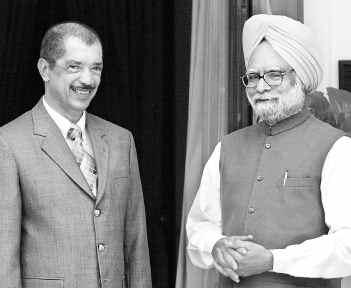IS JAMES MICHEL TREADING ON DANGEROUS GROUND?

During the cold war era, former President Rene became a dab hand at playing the Americans against the Russians. He got away with it because of the political tension, which existed between the two at the time. Mr. Rene was very successful at playing the American card or the Russian card whenever there was a need to do so to get his Administration out of a tight economic spot. The Berlin Wall has since come down and the Cold War is long over. The East and West divide has been bridged by Globalisation and the super powers of the world are forming economic alliances, the difference in political ideologies is no longer a cause for division.
Michel has inherited a completely different Seychelles from that of his predecessor and the international political game has changed from political to economical. This is why Michel is now engaged in the game of playing the Chinese against the Indians in the manner that he is. The visit of the Chinese President, Hu Jintao two weeks ago, has raised the stakes in the unfolding competition with India for naval influence in the Indian Ocean.
New Delhi is now hard pressed to protect its own growing economic and security relationship with Seychelles. Seychelles might not have many people; its population today is barely 85,000. Its sprawling 115 islands, however, make Seychelles one of the most strategically important countries in the Indian Ocean. Although the land area of Seychelles is only 435 sq km, it has an Exclusive Economic Zone of nearly 1.3 million sq km.
While international oil companies are beginning to explore for hydrocarbons in it’s waters, the world’s naval powers have always understood the military significance of Seychelles, close to some of the most important sea-lanes in the world. A couple of years ago, India had to pre-empt a Chinese offer on naval assistance to Seychelles. In February 2005, the Indian Naval Chief, Adm Arun Prakash, donated the “INS Tarmugli” to the Seychelles Coast Guard. The Naval Headquarters in India considered the request from Seychelles so urgent that it decided to pull the ship out of its own fleet barely three years after commissioning.
For the moment though, India’s presence in Seychelles is robust. Seychelles has about 6,000 people of Indian origin. India’s economic presence is marked by Bharti Airtel, which runs a local telecom network. India has trained large numbers of police and military men from Seychelles. A memorandum of understanding on defense cooperation was signed when then Vice President Bhairon Singh Shekhawat visited Seychelles in 2003. India had also gifted a few helicopters to Seychelles over the years. Indian naval ships routinely visit Seychelles.
However, China now is all set to compete with its intense high-level political attention.
Seychelles President James Alix Michel was in Beijing last November to participate in the first China-Africa summit. Barely three months later, Hu has been on a return visit to Seychelles. Given the small size of Seychelles’ economy and the limited nature of its requirements, China has few difficulties in rapidly expanding its influence in the island state. Hu’s visit has underlined Beijing’s political will to build an enduring strategic presence in the Western Indian Ocean.
The lucrative tuna industry is fast becoming another instrument which both India and China wants a finger in. The Europeans are watching developments in that particular direction very closely. The stakes are high and Seychelles stands to lose, enormously, should President Michel find it difficult to wrap his head around the Chess game he has got himself involved in.


